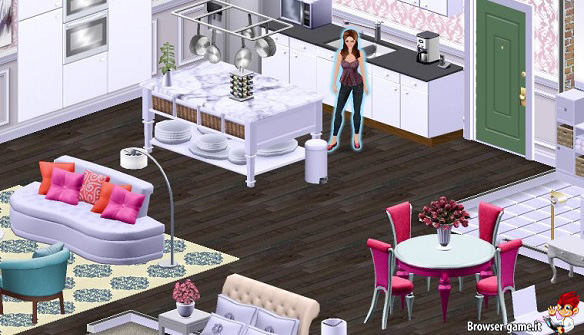
“I would take it even maybe one step further,” she said. But Nordquist thinks that the game actually has more than two styles of gameplay going for it. Disney City Girl isn’t the first title to mash genres together, and it isn’t reinventing the wheel with its life management or fashion aspects. Nordquist admitted it was a balancing act, but not a tricky one since the Playdom team had already worked with ESPN (another Disney-owned company) prior to the acquisition on games like ESPNU College Town.Īnother important goal was to combine multiple forms of play in one game to ensure those players have reasons to keep coming back. “But we’ve actually found through our alpha and beta that the sweet spot we’re hitting is really the 21 to 29-year old crowd, which we’re really excited about.”įor Disney City Girl to achieve that kind of appeal, it meant figuring out a way to give players an adult-focused experience in terms of storyline and language while also keeping it family-friendly enough to represent the larger Disney brand. “For our core demographic, we at Playdom have had the female social gamers with Gardens of Time and some of the subsequent hits we’ve had after that,” Nordquist said. And if you’re fortunate, you end up roping in other players you weren’t necessarily expecting. The studio learned multiple lessons from Sorority Life that it applied to Disney City Girl one of which was that targeting a specific demographic instead of simply going for critical mass isn’t such a bad thing.

Perhaps more importantly, the studio found that it could create a game with legs: Sorority Life, a game that doesn’t have millions of monthly active users but still manages to turn a profit more than four years after its release. Playdom had its share of hits in the time when Facebook games were at their hottest, including the likes of Social City and Gardens of Time. Nordquist speaks from experience, having been with Playdom before the studio was acquired by Disney in September of 2010. “That’s what I’ve seen in the gameplay just even in the last three years I’ve been in the social space.” “I don’t see Facebook gaming going anywhere any time soon, I see the player base continuing to evolve and wanting richer experiences,” Nordquist told Gamezebo. That’s certainly what Rachel Nordquist, product manager for Disney City Girl at Disney Interactive, is counting on. Maybe they just needed something a little different to play. Then again, Facebook is still the second most heavily visited site on the internet, and all of those visitors – especially females, who make up more than half of Facebook’s traffic on any given day – didn’t just give up wanting to play games overnight. When high profile sequels like CityVille 2 are getting shuttered after just a few months, and Mark Pincus is saying he wishes Zynga would have gone “all-in on mobile” earlier, it really does sound like all hope is lost.

In case you need anecdotal evidence, consider that Zynga, the company that made its name by dominating Facebook gaming, is now trying desperately to pivot to mobile. Mobile is the way to go from here on out. Facebook has run its course as a gaming platform. You’ve no doubt heard the refrain, because it’s everywhere.


 0 kommentar(er)
0 kommentar(er)
